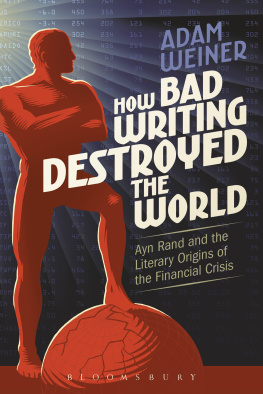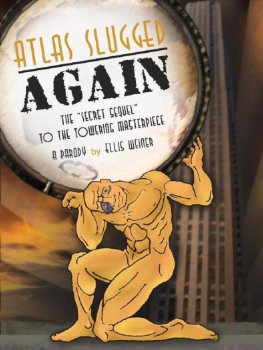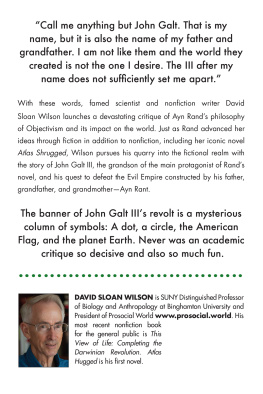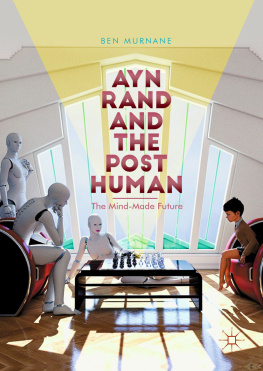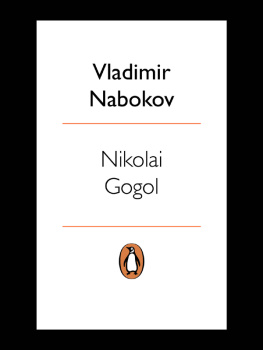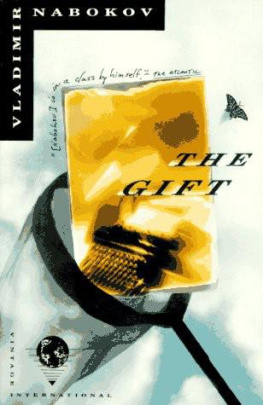How Bad Writing Destroyed the World
For Jenette
How Bad Writing Destroyed the World
Ayn Rand and the Literary Origins of the Financial Crisis
Adam Weiner
Bloomsbury Academic
An imprint of Bloomsbury Publishing Inc

Contents
VLADIMIR NABOKOV
The ideas of economists and political philosophers, both when they are right and when they are wrong, are more powerful than is commonly understood. Indeed the world is ruled by little else. Practical men, who believe themselves to be exempt from any intellectual influences, are usually the slaves of some defunct economist.
JOHN MAYNARD KEYNES
Many would be surprised to learn that classic Russian literature offers special insight into the ongoing American economic crisis. In a very real way, this crisis derives from a defunct economist, a man who is all but forgotten today, especially outside Russian borders. Nikolai Chernyshevsky (182889) was one of the great destructive influences of the past two centuries. His philosophy of rational egoism, as he presented it in his history-shaping novel What Is to Be Done? Some Stories about the New People (1863), would later become the foundation of Ayn Rands objectivism. At first glance this is surprising since Chernyshevsky is Russias great native socialist and Rand our very own arch-capitalist: it would seem that there must be a flaw either in the logic of rational egoism or in the logic of objectivismor in both. But then logic, which both Chernyshevsky and Rand claimed as central to their philosophy, can create different, even antithetical, results, depending upon its premises. The claim being made in all seriousness is that the rational pursuit of selfish gain on the part of each individual must give rise to the ideal form of society. Odd: the very combination of the words rational and egoism should summon up grave doubts in those who have felt egoism and possessed sufficient rational sense to calculate its effects. Experience teaches quite the opposite: reason immediately abandons the mind of a person in pursuit of selfish ends. To say that all of this is nave is to put it charitablythough, ironically, Chernyshevskys system, like Rands, strictly forbids charity. The deep logic that drives both systems is that of behavioral conditioning. By programming Alan Greenspan with objectivism and, literally, walking him into the highest circles of government, Rand had effectively chucked a ticking time bomb into the boiler room of the US economy. I am choosing my metaphor deliberately: as I will show, infiltration and bomb-throwing were revolutionary methods that shaped the tradition upon which Rand was consciously or unconsciously drawing. While I do not want to equate Lenins bloody repression with the economic devastation Greenspan caused as chairman of the Federal Reserve, I will observe that human suffering is a real possibility when robots programmed with ideas from destructive books are released upon reality.
How could such folly have become realitytwice? It happened through a combination of bad writers, bad readers, and bad luck. Bad luck, in particular, plays a central role in this story. In this regard Chernyshevskys case is astounding. Imprisoned for sedition in 1862 in the Peter and Paul Fortress in St. Petersburg, he asked for permission to write a novel. For some reason the prison warden granted him permission. The book turned out to be What Is to Be Done? a thinly disguised training manual for revolutionaries. Next the tsars censor allowed the novel to be published on the pages of the widely read journal, The Contemporary , which, under Chernyshevskys editorship, had become a hotbed of radicalism. The censor had apparently reasoned that the novel was so dreadfully written that it could only hurt the radical cause: fateful miscalculation. Finally, Nikolai Nekrasov, the great Russian poet and editor of The Contemporary , forgot the only copy of Chernyshevskys manuscript in his horse-drawn cab. This should have saved humanity from the consequences of Chernyshevskys book, but Nekrasov published a note about the lost manuscript in the paper, and against all odds it was soon returned to him byof all peoplea policeman.
Still, the most surprising part of this story is not attributable to luck. Some devastating algorithm of Chernyshevskys novel became very effective at converting people into terrorists. The The literary critic Alexander Skabichevsky was in his mid-twenties when Chernyshevskys novel appeared, and he later recalled its popularity among the intelligentsia:
We read the novel almost like worshippers, with the kind of piety with which we read religious books, and without the slightest trace of a smile on our lips. The influence of the novel on our society was colossal. It played a great role in Russian life, especially among the leading members of the intelligentsia who were embarking on the road to socialism,
Mikhail Katkov, the editor of the journal Russkii vestnik (The Russian Messenger) , wrote that young people in the 1860s worshipped Chernyshevskys novel like Moslems honor the Koran. The imitators of Chernyshevskys heroes, especially of his superman, Rakhmetov, would eventually include extremists like Vera Zasulich, Nikolai Ishutin, Dmitry Karakozov, Sergei Nechaev, and Alexander and Vladimir Ulyanov (Lenin).
Fyodor Dostoevsky was a mawkish and second-rate writer in 1863, but grasping the apocalyptic potential of What Is to Be Done? , he was compelled to reinvent himself as a brilliantly innovative novelists in order to fight Chernyshevsky and the westernizing trend he represented. Dostoevskys first great work of literature, Notes from the Underground (1864), was a direct response to Chernyshevskys novel. His four classic novels, Crime and Punishment (1866), The Idiot (1868), The Devils (1872), and The Brothers Karamazov (1880), build upon the stylistic discoveries made, so to speak, in the laboratory of the underground. For much of the remainder of his life, Dostoevsky continued to ridicule Chernyshevskys ideals, attempting to replace them with a mystical religious alternative he would come to call the Russian Idea. The decade that followed the publication of What Is to Be Done? witnessed a strange race between life and literature, as Dostoevsky kept trying to stomp out the revolutionary fire, while the living imitators of Rakhmetov kept lighting new ones. Dostoevsky died, and the fire spread out of control. Lenin read What Is to Be Done? and was reborn an austere, uncompromising, real-life Rakhmetov. He would go on to lead the Russian Revolution and authorize the Red Terror, bequeathing an apparatus and methodology of repression to Stalin.
Having escaped the Red Terror, Nabokov spent twenty years in Europe, writing under the pen name of V. Sirin and becoming the greatest novelist of the Russian diaspora. The last novel Nabokov wrote in Russian is his farewell to Russian literature, The Gift (1937). At the heart of The Gift is an eccentric biography of Chernyshevsky that is meant to contain and neutralize the harmful influence of What Is to Be Done? Nabokovs novel is an exorcism by satire: Chernyshevsky was a materialist but he did not know nature; he raised the blind worship of material things to a spiritual level. Nor does Nabokov spare Dostoevsky, whom he portrays in a ludicrous light in his encounter with Chernyshevsky. From Nabokovs point of view Chernyshevsky and Dostoevsky were both hacks because they favored ideology over artistic considerations. Chernyshevskys communist utopia and Dostoevskys Christian one are both rubbish. According to Nabokovs aesthetic, a good writer strives first for perfect form, which in turn chooses its own content; and art must be created according to its own standards rather than bent to the artists ideology; otherwise it is mere propaganda. Nabokovs ingenious novel was, of course, bypassed by history.

